Sociocultural Morality in Sociology: Norms, Laws, Roles and Examples
VerifiedAdded on 2022/10/10
|5
|960
|17
Essay
AI Summary
This sociology essay examines sociocultural morality, focusing on the acceptable and unacceptable conduct that governs interactions within a society. It defines key concepts such as norms (formal and informal), folkways, mores, laws, and roles, illustrating each with examples. The essay explains how these moral codes influence societal coexistence and individual behavior. It differentiates between folkways (group customs), mores (societal rules of right and wrong), laws (documented social norms), and roles (behavioral expectations based on social functionality). Examples include Facebook group rules (folkway), dressing at a funeral (more), contract laws (law), and parental roles (role). The essay emphasizes the importance of understanding these concepts for peaceful and interactive societal living, referencing the adaptation period for role changes and the impact of violating societal norms.
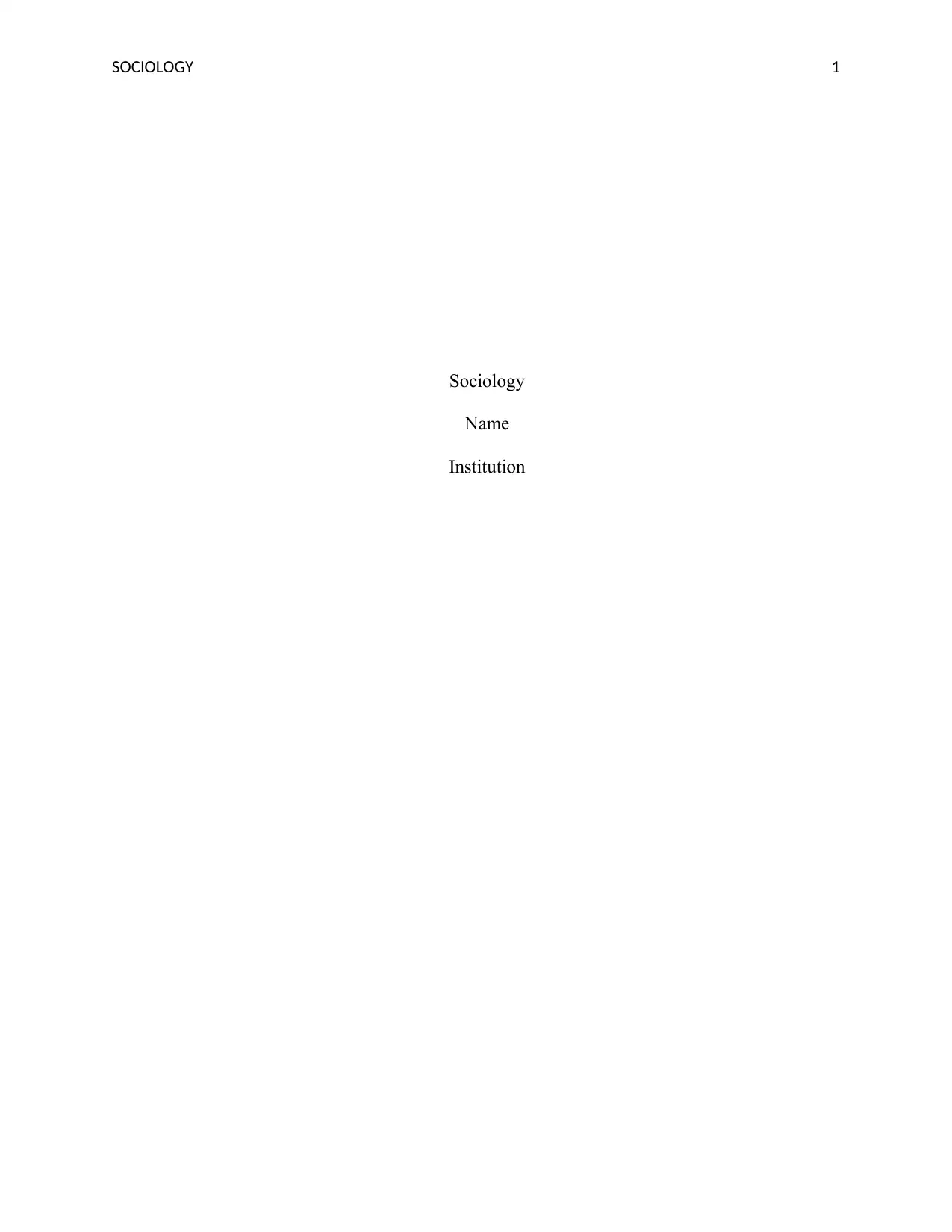
SOCIOLOGY 1
Sociology
Name
Institution
Sociology
Name
Institution
Paraphrase This Document
Need a fresh take? Get an instant paraphrase of this document with our AI Paraphraser
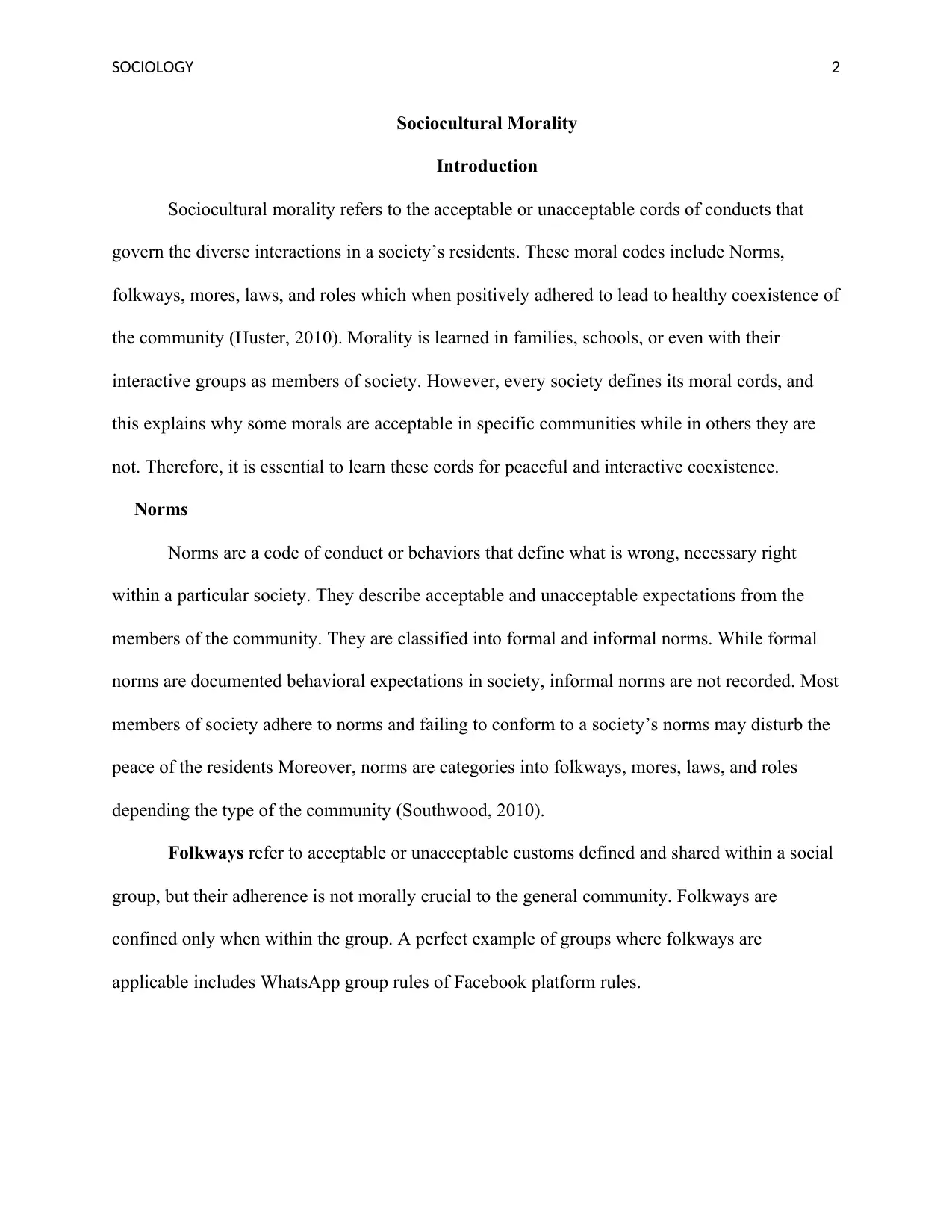
SOCIOLOGY 2
Sociocultural Morality
Introduction
Sociocultural morality refers to the acceptable or unacceptable cords of conducts that
govern the diverse interactions in a society’s residents. These moral codes include Norms,
folkways, mores, laws, and roles which when positively adhered to lead to healthy coexistence of
the community (Huster, 2010). Morality is learned in families, schools, or even with their
interactive groups as members of society. However, every society defines its moral cords, and
this explains why some morals are acceptable in specific communities while in others they are
not. Therefore, it is essential to learn these cords for peaceful and interactive coexistence.
Norms
Norms are a code of conduct or behaviors that define what is wrong, necessary right
within a particular society. They describe acceptable and unacceptable expectations from the
members of the community. They are classified into formal and informal norms. While formal
norms are documented behavioral expectations in society, informal norms are not recorded. Most
members of society adhere to norms and failing to conform to a society’s norms may disturb the
peace of the residents Moreover, norms are categories into folkways, mores, laws, and roles
depending the type of the community (Southwood, 2010).
Folkways refer to acceptable or unacceptable customs defined and shared within a social
group, but their adherence is not morally crucial to the general community. Folkways are
confined only when within the group. A perfect example of groups where folkways are
applicable includes WhatsApp group rules of Facebook platform rules.
Sociocultural Morality
Introduction
Sociocultural morality refers to the acceptable or unacceptable cords of conducts that
govern the diverse interactions in a society’s residents. These moral codes include Norms,
folkways, mores, laws, and roles which when positively adhered to lead to healthy coexistence of
the community (Huster, 2010). Morality is learned in families, schools, or even with their
interactive groups as members of society. However, every society defines its moral cords, and
this explains why some morals are acceptable in specific communities while in others they are
not. Therefore, it is essential to learn these cords for peaceful and interactive coexistence.
Norms
Norms are a code of conduct or behaviors that define what is wrong, necessary right
within a particular society. They describe acceptable and unacceptable expectations from the
members of the community. They are classified into formal and informal norms. While formal
norms are documented behavioral expectations in society, informal norms are not recorded. Most
members of society adhere to norms and failing to conform to a society’s norms may disturb the
peace of the residents Moreover, norms are categories into folkways, mores, laws, and roles
depending the type of the community (Southwood, 2010).
Folkways refer to acceptable or unacceptable customs defined and shared within a social
group, but their adherence is not morally crucial to the general community. Folkways are
confined only when within the group. A perfect example of groups where folkways are
applicable includes WhatsApp group rules of Facebook platform rules.
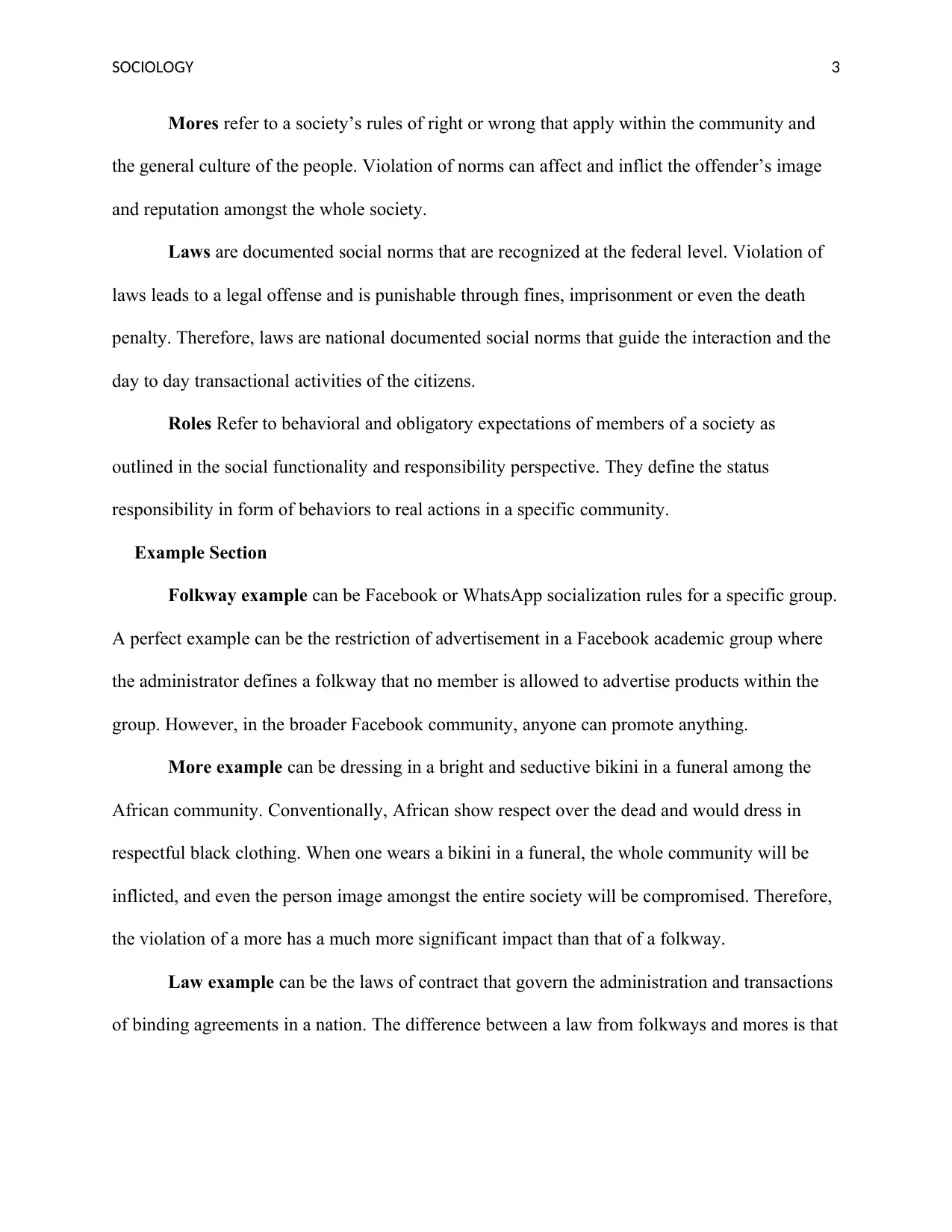
SOCIOLOGY 3
Mores refer to a society’s rules of right or wrong that apply within the community and
the general culture of the people. Violation of norms can affect and inflict the offender’s image
and reputation amongst the whole society.
Laws are documented social norms that are recognized at the federal level. Violation of
laws leads to a legal offense and is punishable through fines, imprisonment or even the death
penalty. Therefore, laws are national documented social norms that guide the interaction and the
day to day transactional activities of the citizens.
Roles Refer to behavioral and obligatory expectations of members of a society as
outlined in the social functionality and responsibility perspective. They define the status
responsibility in form of behaviors to real actions in a specific community.
Example Section
Folkway example can be Facebook or WhatsApp socialization rules for a specific group.
A perfect example can be the restriction of advertisement in a Facebook academic group where
the administrator defines a folkway that no member is allowed to advertise products within the
group. However, in the broader Facebook community, anyone can promote anything.
More example can be dressing in a bright and seductive bikini in a funeral among the
African community. Conventionally, African show respect over the dead and would dress in
respectful black clothing. When one wears a bikini in a funeral, the whole community will be
inflicted, and even the person image amongst the entire society will be compromised. Therefore,
the violation of a more has a much more significant impact than that of a folkway.
Law example can be the laws of contract that govern the administration and transactions
of binding agreements in a nation. The difference between a law from folkways and mores is that
Mores refer to a society’s rules of right or wrong that apply within the community and
the general culture of the people. Violation of norms can affect and inflict the offender’s image
and reputation amongst the whole society.
Laws are documented social norms that are recognized at the federal level. Violation of
laws leads to a legal offense and is punishable through fines, imprisonment or even the death
penalty. Therefore, laws are national documented social norms that guide the interaction and the
day to day transactional activities of the citizens.
Roles Refer to behavioral and obligatory expectations of members of a society as
outlined in the social functionality and responsibility perspective. They define the status
responsibility in form of behaviors to real actions in a specific community.
Example Section
Folkway example can be Facebook or WhatsApp socialization rules for a specific group.
A perfect example can be the restriction of advertisement in a Facebook academic group where
the administrator defines a folkway that no member is allowed to advertise products within the
group. However, in the broader Facebook community, anyone can promote anything.
More example can be dressing in a bright and seductive bikini in a funeral among the
African community. Conventionally, African show respect over the dead and would dress in
respectful black clothing. When one wears a bikini in a funeral, the whole community will be
inflicted, and even the person image amongst the entire society will be compromised. Therefore,
the violation of a more has a much more significant impact than that of a folkway.
Law example can be the laws of contract that govern the administration and transactions
of binding agreements in a nation. The difference between a law from folkways and mores is that
⊘ This is a preview!⊘
Do you want full access?
Subscribe today to unlock all pages.

Trusted by 1+ million students worldwide
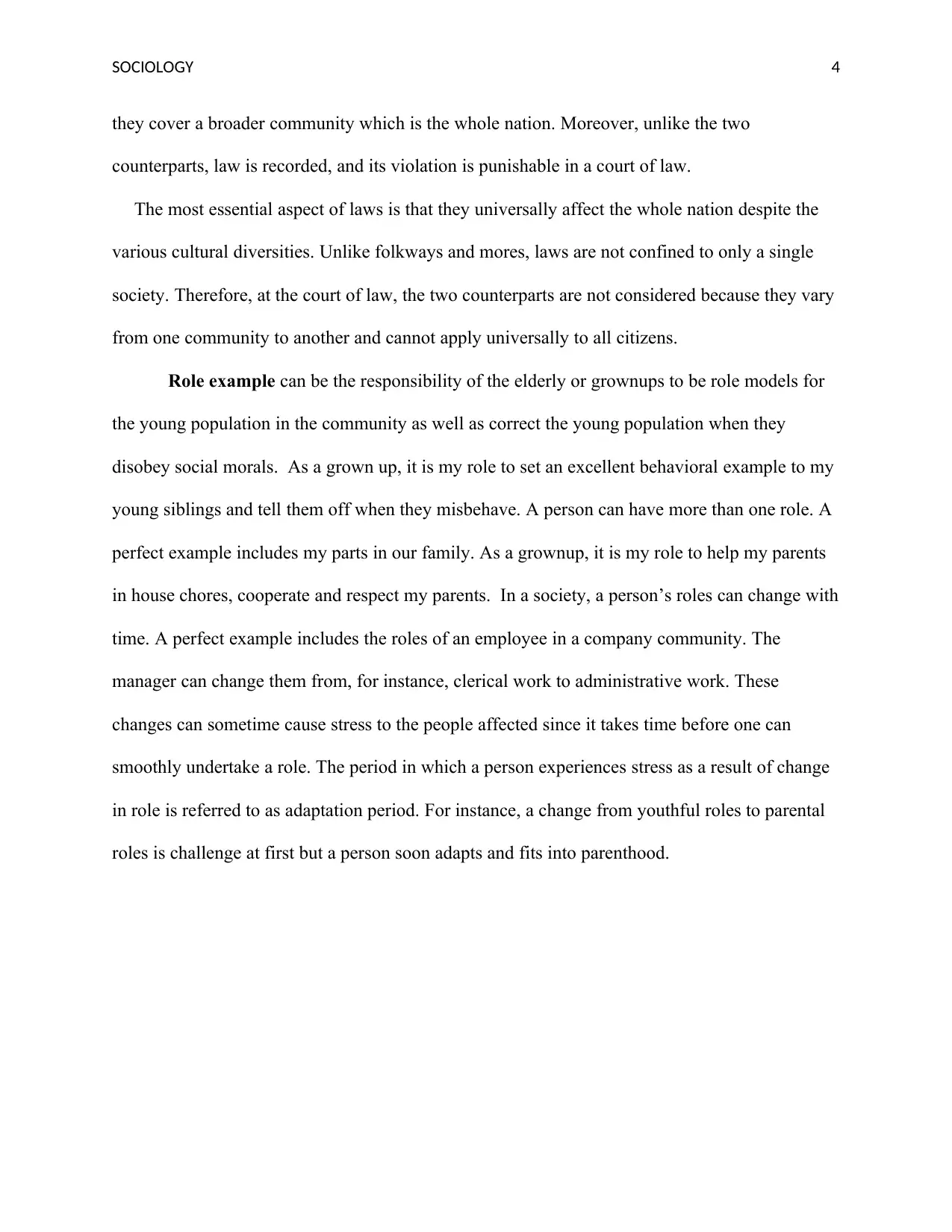
SOCIOLOGY 4
they cover a broader community which is the whole nation. Moreover, unlike the two
counterparts, law is recorded, and its violation is punishable in a court of law.
The most essential aspect of laws is that they universally affect the whole nation despite the
various cultural diversities. Unlike folkways and mores, laws are not confined to only a single
society. Therefore, at the court of law, the two counterparts are not considered because they vary
from one community to another and cannot apply universally to all citizens.
Role example can be the responsibility of the elderly or grownups to be role models for
the young population in the community as well as correct the young population when they
disobey social morals. As a grown up, it is my role to set an excellent behavioral example to my
young siblings and tell them off when they misbehave. A person can have more than one role. A
perfect example includes my parts in our family. As a grownup, it is my role to help my parents
in house chores, cooperate and respect my parents. In a society, a person’s roles can change with
time. A perfect example includes the roles of an employee in a company community. The
manager can change them from, for instance, clerical work to administrative work. These
changes can sometime cause stress to the people affected since it takes time before one can
smoothly undertake a role. The period in which a person experiences stress as a result of change
in role is referred to as adaptation period. For instance, a change from youthful roles to parental
roles is challenge at first but a person soon adapts and fits into parenthood.
they cover a broader community which is the whole nation. Moreover, unlike the two
counterparts, law is recorded, and its violation is punishable in a court of law.
The most essential aspect of laws is that they universally affect the whole nation despite the
various cultural diversities. Unlike folkways and mores, laws are not confined to only a single
society. Therefore, at the court of law, the two counterparts are not considered because they vary
from one community to another and cannot apply universally to all citizens.
Role example can be the responsibility of the elderly or grownups to be role models for
the young population in the community as well as correct the young population when they
disobey social morals. As a grown up, it is my role to set an excellent behavioral example to my
young siblings and tell them off when they misbehave. A person can have more than one role. A
perfect example includes my parts in our family. As a grownup, it is my role to help my parents
in house chores, cooperate and respect my parents. In a society, a person’s roles can change with
time. A perfect example includes the roles of an employee in a company community. The
manager can change them from, for instance, clerical work to administrative work. These
changes can sometime cause stress to the people affected since it takes time before one can
smoothly undertake a role. The period in which a person experiences stress as a result of change
in role is referred to as adaptation period. For instance, a change from youthful roles to parental
roles is challenge at first but a person soon adapts and fits into parenthood.
Paraphrase This Document
Need a fresh take? Get an instant paraphrase of this document with our AI Paraphraser
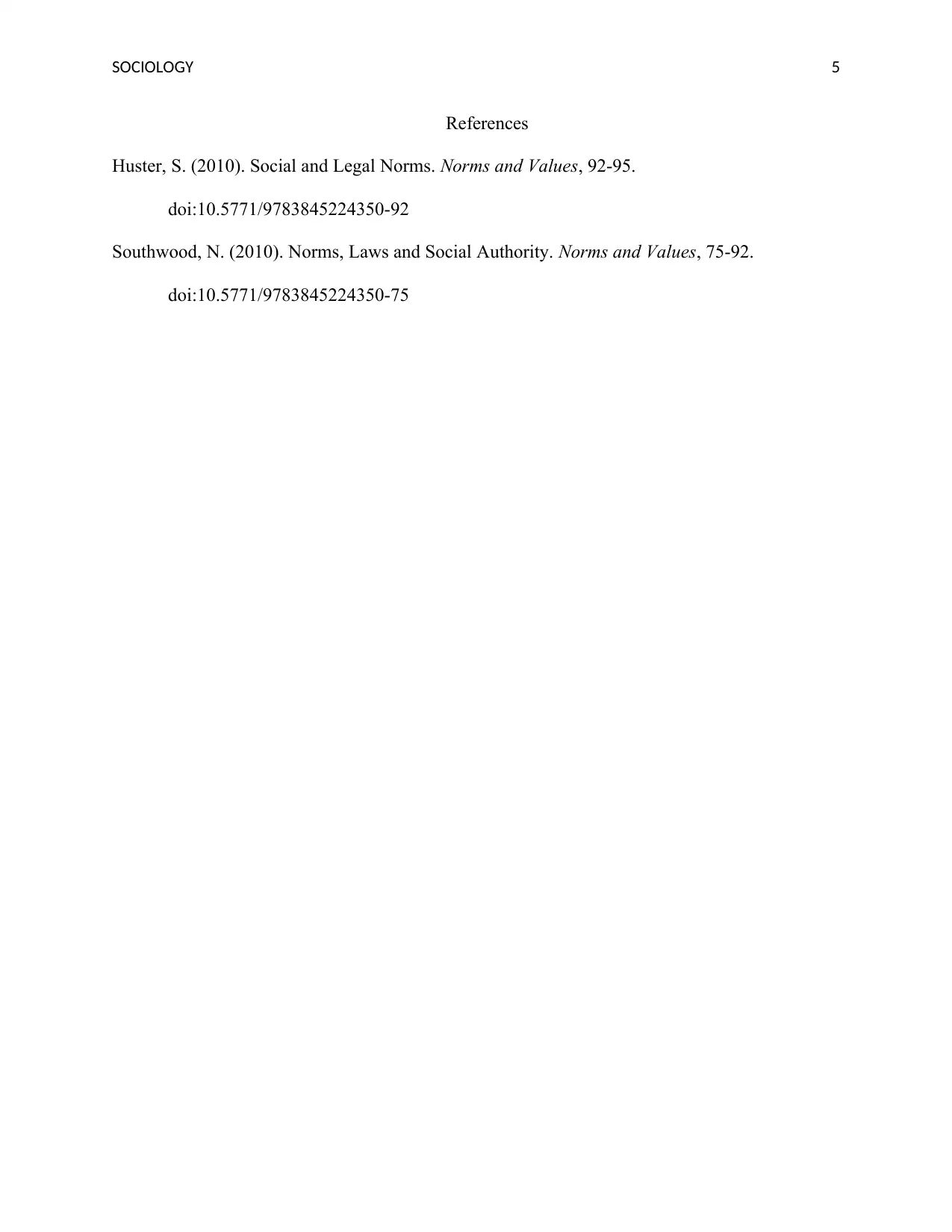
SOCIOLOGY 5
References
Huster, S. (2010). Social and Legal Norms. Norms and Values, 92-95.
doi:10.5771/9783845224350-92
Southwood, N. (2010). Norms, Laws and Social Authority. Norms and Values, 75-92.
doi:10.5771/9783845224350-75
References
Huster, S. (2010). Social and Legal Norms. Norms and Values, 92-95.
doi:10.5771/9783845224350-92
Southwood, N. (2010). Norms, Laws and Social Authority. Norms and Values, 75-92.
doi:10.5771/9783845224350-75
1 out of 5
Your All-in-One AI-Powered Toolkit for Academic Success.
+13062052269
info@desklib.com
Available 24*7 on WhatsApp / Email
![[object Object]](/_next/static/media/star-bottom.7253800d.svg)
Unlock your academic potential
Copyright © 2020–2026 A2Z Services. All Rights Reserved. Developed and managed by ZUCOL.

